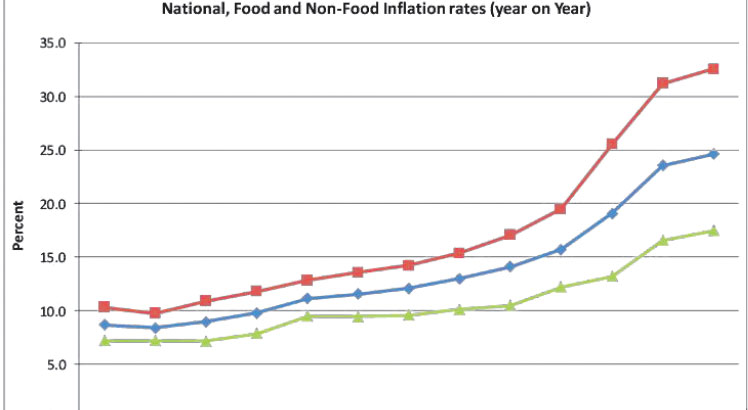Commodity prices to continue rising—RBM
The Reserve Bank of Malawi (RBM) says despite global trends showing a slowdown in prices for key commodities in July, there is little hope that the decline in prices will trickle down to the country’s economy.
In its July 2022 RBM Market Intelligence Report published on its website www.rbm.mw, the central bank said it is highly unlikely that prices will continue to slow down, but will continue souring, thereby putting pressure on the country’s inflation rate currently at 24.6 percent.
The RBM said unless there are interventions to reverse the soaring prices of crucial commodities, heightened inflation pressures could persist up to 2023.

Reads the report in part: “Despite the decreases observed in a few countries recently, the current levels of inflation are significantly above the individual country inflation targets.
“Although some commodity prices declined in July, it is likely that they could rise again in the near-term, particularly Brent crude oil as the winter season commences in the Northern Hemisphere. Therefore, inflation pressures are expected to persist.”
RBM, however, said it remains vigilant and will take necessary action to ensure that inflation expectations are well anchored and households’ purchasing power is not eroded.
Meanwhile, Malawi’s inflation is fast rising, triggered by a rise in food and non-food prices.
National Statistical Office (NSO) data shows that headline inflation rate for July increased by 24.6 percent from 23.5 percent recorded in June.
At 24.6 percent, the July inflation is way above the RBM 2022 inflation target set at 23.2 percent during the third Monetary Policy Committee (MPC) meeting in July this year.
In Malawi, maize, as part of the food component contributes about 52 percent to the Consumer Price Index, a measure of price change in a basket of constant quantity and quality of goods and services.
Between January and July this year, food inflation rose from 14.2 percent to 32.5 percent, according to NSO data.
Meanwhile, local maize prices have continued to rise, with a 50 kilogramme (kg) bag of maize now selling at K18 500, up from K15 500 recorded in July, according to the World Food Programme Minimum Expenditure Basket published earlier this month.
On the other hand, oil prices have remained volatile due to potential supply constraints following the conflict between Russia and Ukraine.
This has pushed up local pump prices, with petrol now selling at K1 946 per litre while diesel and paraffin are now selling at K1 920 and K1 236 per litre, respectively.
Speaking in an interview yesterday, Catholic University of Malawi economics lecturer Hopkins Kawaye said inflation is expected to continue rising largely due to effects of imported inflation.
On the other hand, the World Bank has also warned that the rising commodity prices, especially food prices, which have triggered a global food crisis, will drive millions into extreme poverty and erase economic gains, especially in low-income countries.
In a published blog last week, World Bank Sustainable Development vice-president Juergen Voegele said rising food prices will have a greater impact on people in low- and middle-income countries.
During the third MPC last month, RBM revised the 2022 annual average headline inflation to 23.2 percent from an earlier forecast of 12.3 percent.





